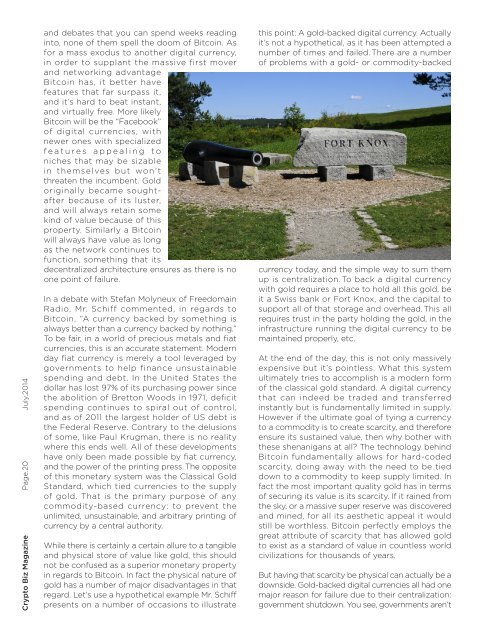Crypto Biz Magazine—July, 2014/Issue.02
Digital Currencies & Crypto Innovations—We observe and explore all aspects of the crypto world, including mining, financial trading, exchanges, development and business.
Digital Currencies & Crypto Innovations—We observe and explore all aspects of the crypto world, including mining, financial trading, exchanges, development and business.
You also want an ePaper? Increase the reach of your titles
YUMPU automatically turns print PDFs into web optimized ePapers that Google loves.
Page.20 July.<strong>2014</strong><br />
<strong>Crypto</strong> <strong>Biz</strong> Magazine<br />
and debates that you can spend weeks reading<br />
into, none of them spell the doom of Bitcoin. As<br />
for a mass exodus to another digital currency,<br />
in order to supplant the massive first mover<br />
and networking advantage<br />
Bitcoin has, it better have<br />
features that far surpass it,<br />
and it’s hard to beat instant,<br />
and virtually free. More likely<br />
Bitcoin will be the “Facebook”<br />
of digital currencies, with<br />
newer ones with specialized<br />
features appealing to<br />
niches that may be sizable<br />
in themselves but won’t<br />
threaten the incumbent. Gold<br />
originally became soughtafter<br />
because of its luster,<br />
and will always retain some<br />
kind of value because of this<br />
property. Similarly a Bitcoin<br />
will always have value as long<br />
as the network continues to<br />
function, something that its<br />
decentralized architecture ensures as there is no<br />
one point of failure.<br />
In a debate with Stefan Molyneux of Freedomain<br />
Radio, Mr. Schiff commented, in regards to<br />
Bitcoin, “A currency backed by something is<br />
always better than a currency backed by nothing.”<br />
To be fair, in a world of precious metals and fiat<br />
cur rencies, this is an accurate statement. Modern<br />
day fiat currency is merely a tool leveraged by<br />
governments to help finance unsustainable<br />
spending and debt. In the United States the<br />
dollar has lost 97% of its purchasing power since<br />
the abolition of Bretton Woods in 1971, deficit<br />
spending continues to spiral out of control,<br />
and as of 2011 the largest holder of US debt is<br />
the Federal Reserve. Contrary to the delusions<br />
of some, like Paul Krugman, there is no reality<br />
where this ends well. All of these developments<br />
have only been made possible by fiat currency,<br />
and the power of the printing press. The opposite<br />
of this monetary system was the Classical Gold<br />
Standard, which tied currencies to the supply<br />
of gold. That is the primary purpose of any<br />
commodity-based currency: to prevent the<br />
unlimited, unsustainable, and arbitrary printing of<br />
currency by a central authority.<br />
While there is certainly a certain allure to a tangible<br />
and physical store of value like gold, this should<br />
not be confused as a superior monetary property<br />
in regards to Bitcoin. In fact the physical nature of<br />
gold has a number of major disadvantages in that<br />
regard. Let’s use a hypothetical example Mr. Schiff<br />
presents on a number of occasions to illustrate<br />
this point: A gold-backed digital currency. Actually<br />
it’s not a hypothetical, as it has been attempted a<br />
number of times and failed. There are a number<br />
of problems with a gold- or commodity-backed<br />
currency today, and the simple way to sum them<br />
up is centralization. To back a digital currency<br />
with gold requires a place to hold all this gold, be<br />
it a Swiss bank or Fort Knox, and the capital to<br />
support all of that storage and overhead. This all<br />
requires trust in the party holding the gold, in the<br />
infrastructure running the digital currency to be<br />
maintained properly, etc.<br />
At the end of the day, this is not only massively<br />
expensive but it’s pointless. What this system<br />
ultimately tries to accomplish is a modern form<br />
of the classical gold standard. A digital currency<br />
that can indeed be traded and transferred<br />
instantly but is fundamentally limited in supply.<br />
However if the ultimate goal of tying a currency<br />
to a commodity is to create scarcity, and therefore<br />
ensure its sustained value, then why bother with<br />
these shenanigans at all? The technology behind<br />
Bitcoin fundamentally allows for hard-coded<br />
scarcity, doing away with the need to be tied<br />
down to a commodity to keep supply limited. In<br />
fact the most important quality gold has in terms<br />
of securing its value is its scarcity. If it rained from<br />
the sky, or a massive super reserve was discovered<br />
and mined, for all its aesthetic appeal it would<br />
still be worthless. Bitcoin perfectly employs the<br />
great attribute of scarcity that has allowed gold<br />
to exist as a standard of value in countless world<br />
civilizations for thousands of years.<br />
But having that scarcity be physical can actually be a<br />
downside. Gold-backed digital currencies all had one<br />
major reason for failure due to their centralization:<br />
government shutdown. You see, governments aren’t


